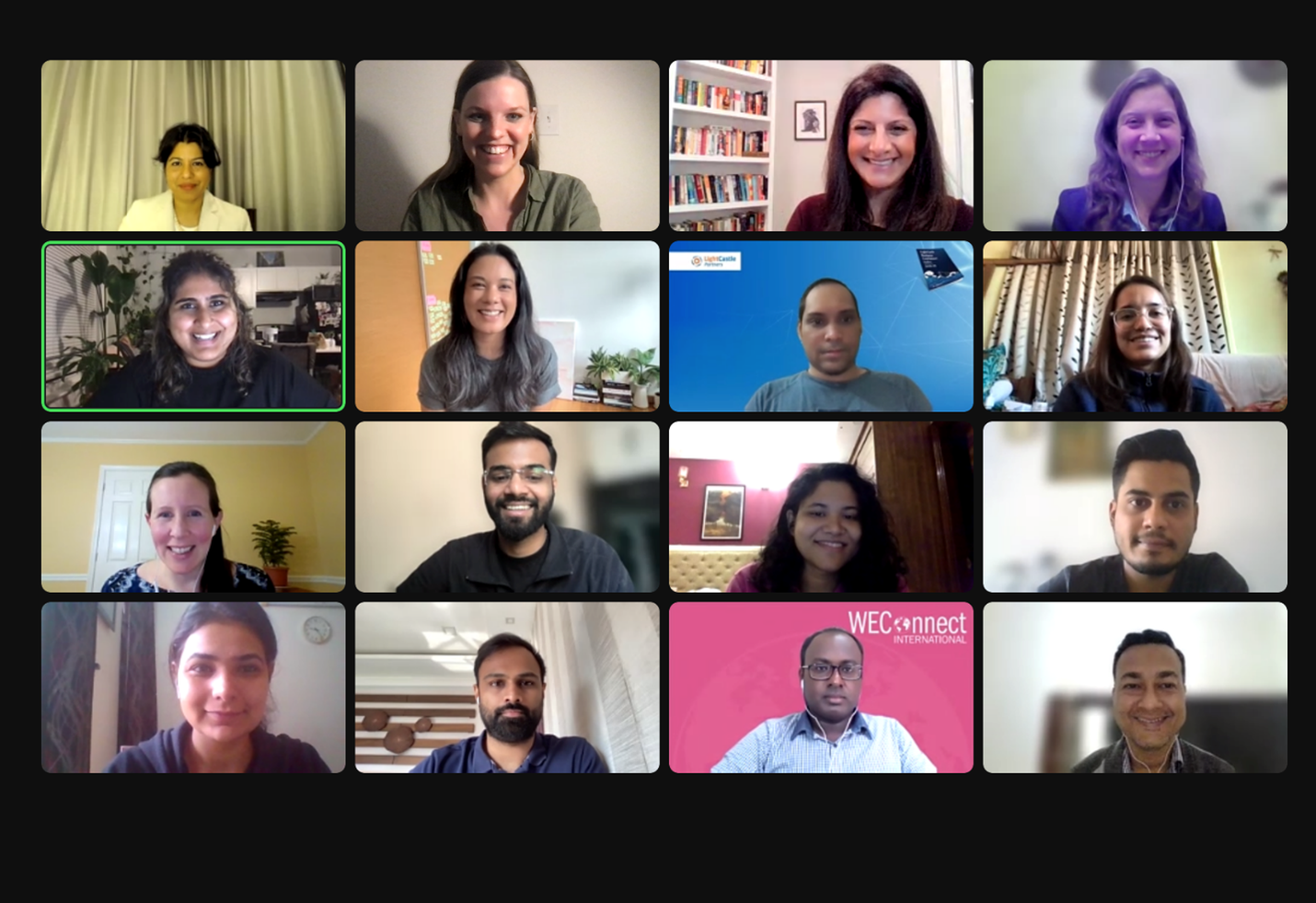Let us know what type of content you'd like to see more of. Fill out our three question survey.
The Path to a Sustained Network for Women Entrepreneurs in South Asia: Insights from the SARDI Strengthening Women in Tech Symposium
Mar 23, 2022
How do you take your chai or coffee? These opening words welcomed participants from all around the world for the South Asia Regional Digital Initiative (SARDI) Strengthening Symposium, a series of conversations about the most pressing barriers to investment in women-owned enterprises. Covering tremendous ground in 10 hours over four days, this virtual event connected finalists for potential partnerships, inspired applicants by clearly articulating the goals of the activity, and strengthened phase two applications in the process for the Strengthening Women in Tech in South Asia Initiative.
This SARDI initiative, implemented under the Digital Connectivity and Cybersecurity Partnership (DCCP),aims to address barriers for women entrepreneurs seeking to expand their business by connecting women across the region for peer-learning opportunities, providing mentorship, investment, and capacity-building support, and building awareness around the ICT policy environment that governs their businesses. The finalists participating in the symposium, ranging from large international organizations to consortia made up of local accelerators and industry associations, are in the running to ultimately design and implement this important regional network.
SARDI designed the symposium to bring together the best and brightest, selecting the top 10 out of more than 40 applicants.
Stories from Women Entrepreneurs
The symposium kicked off with a “Fireside Chat” with women entrepreneurs from SARDI’s four focus countries: India, Sri Lanka, Bangladesh, and Nepal. Participating entrepreneurs Nidhi Pant, S4S Technologies (India); Shana Karan, Shades IT Solutions (Sri Lanka); Dr. Fahreen Hannan, Dhaka Cast (Bangladesh); and Aayushi KC, Khaalisisi Management Pvt Ltd (Nepal) offered insights on opportunities and barriers facing female founders. CEO for WE HUB, Deepthi Ravula, moderated and emphasized that while current women entrepreneurs enjoy opportunities that previous generations did not have, it was clear from the panelists’ stories that negative perceptions and barriers still exist. Entrepreneur Aayushi KC shared her experiences confronting gender bias in Nepal: “I never went into starting the company thinking of myself as a woman entrepreneur,” said KC. “That changed just 15 minutes into my first conversation with a waste entrepreneur [where] I shared [how] our idea [and] platform…could potentially revolutionize the waste industry in Nepal, to which he hysterically laughed at my face.”
KC noted the waste entrepreneur went on to ask her, “Where is the boss?” alluding to his assumption that only men hold positions of authority at work. Investors, lenders, and potential business partners may have similar reactions, leading to the lack of concrete financing opportunities that limit women entrepreneurs’ ability to grow. When asked about non-financial challenges, respondents highlighted themes of self-doubt, noting that lack of role models and mentors was a severe challenge. As Nidhi Pant pointed out, entrepreneurs are more likely to be successful when they “have a very good support system where you can be vulnerable, where you can ask things.” It is networks like these that push women entrepreneurs to take risks and feel confident in their work. Recognizing the urgency for these networks, SARDI, through the Strengthening Women Initiative, is directly responding to a regional need, empowering women entrepreneurs to secure new financing, build new connections, and strengthen their businesses.
Understanding the Context to Inform Our Solutions
Prior to the symposium, SARDI’s Strengthening Women in Tech in South Asia initiative conducted a detailed landscape analysis of women entrepreneurship in Sri Lanka, Bangladesh, India, and Nepal that captured the challenges and opportunities facing women founders, particularly those in the digital space. A total of 47 in-depth interviews revealed a lack of mentorship and limited support for women entrepreneurs in tech across all four countries.
Informed by this research, the symposium hosted an “Activity Deconstruction” session to discuss key findings. Expert consultants shared data from their home countries on the state of the digital ecosystem and women in tech specifically. For example, despite significant growth and investment in Bangladesh’s startup ecosystem in the last decade, the country was 58th among 58 economies in the Mastercard Index of Women Entrepreneurs for 2020 (and is 65th out of 65 in 2021). Dr. Ananya Raihan noted that, “When it comes to women in tech ventures, there is a tendency of tokenism, meaning in every program there is something for women tech entrepreneurs, but it is not accessible to a large part of the women tech ventures. It’s a little bit elitist, which is an area we need to work on.

Participants during SARDI’s Strengthening Women in Tech in South Asia Symposium.
What’s Next
Leveraging our extensive network, the Strengthening Women in Tech in South Asia Initiative will allow the SARDI team to create partnerships as well as find inspiring and relevant mentors for the cohort of women entrepreneurs that we strive to support.
Through our selected finalist and future implementing partner, we hope to see secured finance for women entrepreneurs, increased digital skills, sustained partnerships and engagement across borders, awareness in the impact investment space of more gender-friendly lending practices, effective engagement with the digital policy environment and sustained regional growth and scale for these women entrepreneurs. We hope this activity will help change the status quo in addressing the gender digital divide in the tech sector. Our goal is to offer a robust, vibrant, and sustainable network for women entrepreneurs in digital and digitally enabled businesses in the South Asia region.
SARDI expects to announce the winner of the Strengthening Women in Tech in South Asia Initiative and launch the regional network next month.
SARDI is an activity under and funded by the Digital Connectivity and Cybersecurity Partnership, a whole-of-government global initiative to promote an open, interoperable, reliable, and secure digital economy.